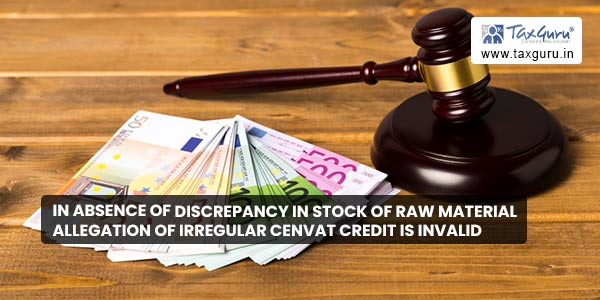Case Law Details
Sahney Commutators Pvt Ltd Vs Commissioner of Central Tax (CESTAT Bangalore)
CESTAT gone through the discussions and findings given by the Appellate Authority where it is highlighted that the invoices relied upon by the appellant is not reflecting same goods. But there is no dispute that the Bare Copper Strips with description Sample ED-192 if cut out into small pieces during the initial process of manufacture was rejected at very beginning of manufacturing. If so, same cannot be invoice as in the very same description. Though, there is a slight discrepancy in the description in invoices, it is an admitted fact that Copper of 1028.8 Kgs were supplied by suppliers, it was returned for Job work due to defect and on completion of Job work, it is sent back to the appellant for further processing vide Invoice dated 03.02.2017 by charging only the labour charges. Moreover, during investigation there is no discrepancy pointed out regarding the stock of raw material maintained by the appellant and the return submitted for the relevant period shows proper transaction of said material as claimed by the appellant. After considering the above facts and circumstances, I find no reason to allege that the appellant had availed ineligible CENVAT credit. Hence, the appeal is allowed with consequential relief, if any.

FULL TEXT OF THE CESTAT BANGALORE ORDER
The appellant is manufacturing Commutators and Bare Copper Strip/wire of various sizes are the major input for the manufacture final products. Alleging that appellant irregularly availed CENVAT credit of Rs.57,636/-, present proceedings initiated.
2. Heard both sides and perused the records of the case.
3. Learned Counsel for the appellant submitted that during their course of transaction, they have received 1028.8 Kgs of Bare Copper Strip. While manufacturing final products, these strips were cut into required length and only during manufacturing process, they found that the raw material supplied by the suppliers M/s Copprrod Industries Pvt. Ltd. is generating excess waste and rejected the same. Accordingly, they have informed the supplier regarding the defects in the material and also raised a Debit Note dated 30.11.2015 for the purpose of accounting and for avoiding automatic payments against such defective supply of material. Thereafter, the said material along with the material available with them having 1146 Kgs were packed in bundles and return to the supplier without reversing the CENVAT credit involved on the said quantity and instructed the supplier to convert the copper strips to the required width and size and to return to appellant on JOB work basis. He further submitted that the said material was returned vide Invoice dated 03.02.2017 and the supplier charged Rs.46,656/- towards Job charges. From the above, it is evident that the inputs were carried out within 180 days of being sent to the Job work and they have complied with the conditions stipulated under Rule4(5)(a) of CENVAT Credit Rules 2004. Thereafter, based on an Audit observation, respondent issued SCN as to why CENVAT credit of Rs.57,630/- irregularly availed on the rejected inputs should not be demanded and recovered with interest and penalty should not be imposed under Rule 15(2) of CENVAT Credit Rules, 2004. In reply to the said SCN, the appellant submitted that as per Rule 5A of CENVAT Credit Rules, 2004, even if inputs are sent to Job work for re-conditioning or any other purpose and if the goods are received back in the factory within 180 days of their being sent to Job work, CENVAT credit shall be allowed. During the course of argument, the learned Counsel for the appellant draw my attention to the invoices related to supply of said goods including Invoice dated 07.11.2015 return submitted for relevant period and return challan dated 01.08.2016 and Invoice dated 03.02.2017, Invoice dated 03.02.2017 is showing only labour charges for supply of 1458 Kgs of Copper Strips and based on the above, he submitted that there is no omission on the part of the appellant in claiming CENVAT credit and entire proceedings are unsustainable.
3. Learned AR for the Department reiterated the findings of the impugned order and also pointed out that the descriptions in invoices referred by the learned Counsel for the appellant are not showing very same goods since descriptions in each invoices varies and the impugned order is sustainable as per Section 11(A)(9) of Central Excise Act, 1944.
4. I have gone through the discussions and findings given by the Appellate Authority where it is highlighted that the invoices relied upon by the appellant is not reflecting same goods. But there is no dispute that the Bare Copper Strips with description Sample ED-192 if cut out into small pieces during the initial process of manufacture was rejected at very beginning of manufacturing. If so, same cannot be invoice as in the very same description. Though, there is a slight discrepancy in the description in invoices, it is an admitted fact that Copper of 1028.8 Kgs were supplied by suppliers, it was returned for Job work due to defect and on completion of Job work, it is sent back to the appellant for further processing vide Invoice dated 03.02.2017 by charging only the labour charges. Moreover, during investigation there is no discrepancy pointed out regarding the stock of raw material maintained by the appellant and the return submitted for the relevant period shows proper transaction of said material as claimed by the appellant. After considering the above facts and circumstances, I find no reason to allege that the appellant had availed ineligible CENVAT credit. Hence, the appeal is allowed with consequential relief, if any.
(Order pronounced in the Open Court on 13/02/2023)




